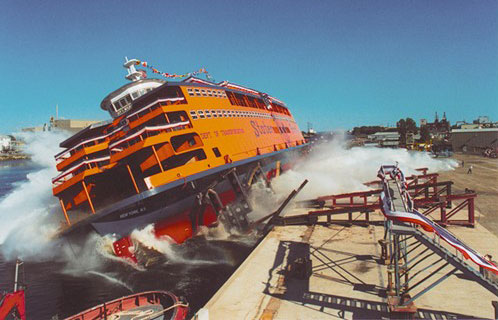Elliott Bay Design Group (EBDG) has been selected by the New York Department of Transportation (NYC DOT) to design a new class of ferries that will operate between the boroughs of Staten Island and Manhattan.
The project scope consists of a complete design package, including contract drawings, specifications and other documents for vessels to replace the existing Barberi and Kennedy-class ferries. Also included in the scope are modifications to the existing Molinari-class ferries to retrofit a new propulsion system, something the city says is necessary to establish consistency between the new ferries and those that will remain in the fleet.
"Given their extensive and proven ferry boat design experience, we are looking forward to working with the Elliott Bay Design Group on this project," said Capt. James C. DeSimone, deputy commissioner and COO, Staten Island Ferry.
Sen. Charles E. Schumer, D-N.Y., has urged the federal government to provide $267 million to the NYC DOT for passenger ferries and upgrades to existing ferry terminals. According to Schumer, damage from Superstorm Sandy has necessitated a more modern and resilient infrastructure, and ferries are a key part of that because of their ability to begin service immediately following a storm given the proper landing equipment. NYC DOT is expected to apply for the grant from the Federal Transit Administration (FTA) Sandy Resilience Program to help pay for the ferries, which will cost an estimated $309 million to build.
"We're excited to get the project underway to build on the work we have done to date," stated EBDG Project Manager Matt Williamson. "We're looking forward to developing a vessel design that meets the need of the Staten Island Ferry on all fronts – economical to construct, efficient to operate and providing safe and reliable service to the people of New York. It’s been a pleasure to partner with NYC DOT to support their iconic vessels; we look forward to continuing our working relationship."
EBDG served as sub-contractor as part of the KPFF project team that performed a Preliminary Design Investigation to ascertain the needs of a future ferry fleet. The results determined that reconstructing the fleet's older classes of boats wasn't economically feasible. Instead, the investigation recommended the design of new double-ended ferry boats with overall passenger capacity of 4,500 and cycloidal propulsion.





